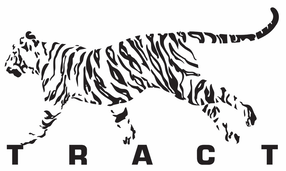- About Us
-
Our Work
-
Our Projects
>
- Integrated Habitat Conservation and Eco Development
- Village Social Transformation
- Community Leadership for Conflict Mitigation
- Tiger Ambassadors - Satpuda Landscape Tiger Partnership
- Securing Women - Daksh Nari
- Tiger Conservation - Satpuda Landscape Tiger Partnership
- Human Wildlife Conflict- Mitigation
- Community for Tigers
- Jungle Patrols
- Consolidation of Habitat
- Training and Workshops
- Gallery
- Concepts
- Initiatives
- Reports
-
Our Projects
>
- Get Involved
- Media
About Us
Tiger Research and Conservation Trust (TRACT) was founded in 2001 as a registered non profit organization and is supported by a wide range of international and national organizations.
TRACT is a dynamic wildlife trust with the aim of conservation of the wild tiger and its habitat within and beyond boundaries. We believe in working at the grass root level, with local communities and with the managers and policy makers of the protected and unprotected forests of Central India.
TRACT is a dynamic wildlife trust with the aim of conservation of the wild tiger and its habitat within and beyond boundaries. We believe in working at the grass root level, with local communities and with the managers and policy makers of the protected and unprotected forests of Central India.
Our Objectives
- We work to protect tigers and their prey beyond the boundaries of protected reserves. Our team comprises of sensitised and trained local youth, who work to protect the wildlife and the forest. We patrol forest fringes, checking for threats to animals and forest. We help facilitate protection to the habitat from illegal extraction and fire.
- We strive to implement a peaceful and continued cohabitation between local communities and large carnivores in buffer forests and forested corridors. TRACT works for minimising human - large carnivore conflict, often pre-empting the threats and preventing conflict issues before they can occur. We work to sensitize these people to the causes of wildlife conflict through educating them on simple changes which bring about a decrease or even a complete halt to conflict situations.
- We work towards advocating and bringing government policies that address the conditions that facilitate conflict.
- TRACT works for bringing livelihood alternatives to local communities, reducing their biotic footprint on the forest habitat and the conditions that cause human - large carnivore conflict.
- We work towards facilitating an inviolate core and the opportunity to locals living inside these reserves to a better life with employment opportunities, medical and educational facilities and so much more. This we do by a hand holding in the Voluntary rehabilitation of village from within the park.
- We aim to build leadership in local communities living in tiger habitat. We provide them with the opportunities and tools to create changes and reduce their vulnerability to conflict and to build capacity to secure themselves and their community.
- We are working towards building capacity in the locals to ensure benefits to them from the booming eco-tourism in the peripheral forests surrounding the core tiger habitats. Instead of viewing these as a pest and a threat, we are slowly changing local people’s perceptions and encouraging them to take ownership of the wildlife they share their lands with.
- We continue to work with policy makers in the regions of Central India to connect the field to the decisions.
- We work towards training stakeholders (forest staff, local communities, police personnel) for mitigating and management of human - wildlife conflict.
- We work with the belief in ensuring not just the immediate safety of the tiger, but also an understanding of the sustainability of the eco system, leading to change in mind-sets of future generations.
Our Strengths
Work done by TRACT is primarily in human dominated areas of the buffer and the fringe forests. These are areas where humans share natural resources with large carnivores, and in this land of co-habitation, the threat of human - wildlife conflict is high.
Our teams comprise of young local men and women, who work with an ownership towards the protection of the wildlife and its habitat. They work with the local communities, ensuring tolerance to this co-habitation, creating a Social Fence along the periphery of reserves.
Our teams comprise of young local men and women, who work with an ownership towards the protection of the wildlife and its habitat. They work with the local communities, ensuring tolerance to this co-habitation, creating a Social Fence along the periphery of reserves.
